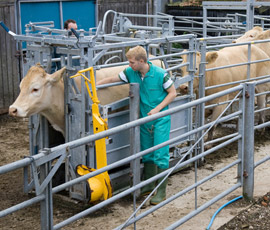TB cattle vaccine takes ‘small step forward’

Scientists have announced a small but important step in the development of an effective cattle vaccine to prevent bovine tuberculosis.
They have identified a “biomarker” using sophisticated molecular technology that allows them to predict vaccine efficacy.
David Williams, chairman of the Badger Trust, which strongly supports vaccination of both cattle and badgers, said: “We welcome this refinement in laboratory technique, part of the progress towards the long-awaited goal of an effective cattle vaccine.
“This discovery represents constant and encouraging movement in molecular studies and techniques, and it follows steady progression elsewhere”.
An author summary of the work, funded by DEFRA, said that cattle vaccination might offer a long-term solution for controlling bovine TB.
“Identification of biomarkers in tuberculosis research remains elusive and the goal of this study was to identify host markers that allow the prediction of vaccine success,” the summary added. “We identified a predictive marker that can be used in future experiments.”
Developing a TB vaccine for badgers and cattle is a long-term goal and a substantial part of DEFRA’s TB Eradication Programme. It plans to invest £15.5m on research and development on cattle vaccines and associated diagnostics over the next three years.
“We welcome this refinement in laboratory technique, part of the progress towards the long-awaited goal of an effective cattle vaccine.”
David Williams, chairman of the Badger Trust
A spokesman for DEFRA said: “This study is part of our ongoing investment in a research programme to develop a cattle vaccine and diagnostic tools to help tackle the spread of bovine TB.
“The findings represent a small advance in our understanding of why some animals respond better to vaccination by BCG than others, but we cannot say with any confidence when a usable cattle vaccine might become available.
“Vaccination remains our long term goal but it cannot replace the need for a cull of badgers as part of our comprehensive strategy to prevent the further spread of TB.”
The government is pressing ahead with its plans to cull badgers in two pilot areas in England next summer to bear down on the disease in wildlife, despite pressure from animal rights groups.
Speaking at the Oxford Farming Conference last week, DEFRA secretary Owen Paterson told delegates that the culls would go ahead this summer, as planned.
“Bovine TB is the most pressing animal health problem in the UK,” Mr Paterson told delegates.
“Its impact on our cattle farmers, their families and their communities cannot be overstated. Last year, TB led to the slaughter of 26,000 cattle in England at a cost of nearly £100m.
“In the past 10 years, bovine TB has cost the taxpayer £500m. This will rise to an estimated £1bn over the next decade if the disease is left unchecked.”
Gloucestershire farmer and NFU TB spokesman Jan Rowe welcomed the announcement of the advance in the development of a cattle vaccine.
“I think anything that increases progress towards a successful cattle vaccine is useful,” he said.
“It’s difficult to understand how big a step this is, but it might slightly speed up the process in determining how successful vaccines are.”
But he added: “At the moment, we just don’t even know how a cattle vaccine might work in British conditions.
“While vaccination may be a very successful tool in the future, we need to be doing something while we wait for one to come along. The time scale is somewhere between six and 10 years and that’s why we are pressing ahead with a cull.”
EU laws stifle progress on cattle vaccination
